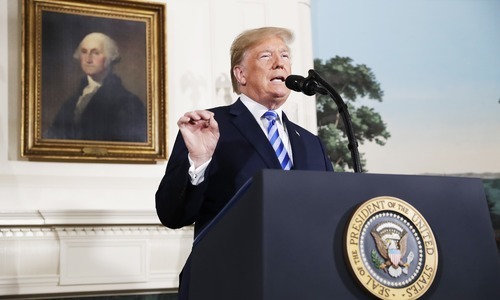The Trump administration on Monday renewed several waivers on US sanctions against Iran, allowing Russian, European and Chinese companies to continue to work on Iran’s civilian nuclear facilities without drawing American penalties.
Secretary of State Mike Pompeo signed off on the waiver extensions but couched the decision as one that continues restrictions on Iran’s atomic work. “Iran’s continued expansion of nuclear activities is unacceptable. The regime’s nuclear extortion is among the greatest threats to international peace and security,” State Department spokeswoman Morgan Ortagus said in a statement.
Current and former officials familiar with the matter said Pompeo had opposed extending the waivers, which are among the few remaining components of the 2015 Iran nuclear deal that the administration has not cancelled.
However, the officials said Treasury Secretary Steven Mnuchin had prevailed in an internal debate on the subject last week by arguing that the coronavirus pandemic made eliminating the waivers unpalatable at a time when the administration is being criticized for refusing to ease sanctions to deal with the outbreak. The officials were not authorised to publicly discuss the decision and spoke on condition of anonymity.
Last week, the administration slapped new sanctions on 20 Iranian people and companies for supporting militia in Iraq held responsible for attacks on bases where US forces are located. At the same time, however, it extended another sanctions waiver to allow energy-starved Iraq to keep importing Iranian power.
President Donald Trump withdrew from the nuclear deal in 2018 and has steadily reimposed US sanctions on Iran that had been eased or lifted under its terms. The so-called “civilian-nuclear cooperation” waivers allow foreign companies to do work at some of Iran’s declared nuclear sites without becoming subject to US sanctions.
Deal supporters say the waivers give international experts a valuable window into Iran’s atomic programme that might otherwise not exist. They also say some of the work, particularly at the Tehran reactor on nuclear isotopes that can be used in medicine, is humanitarian in nature.
But Iran hawks in Congress have been pressing Pompeo to eliminate all the waivers, saying they should be revoked because they give Iran access to technology that could be used for weapons. The hawks most strenuously objected to the waiver that allowed work at Iran’s once-secret Fordow facility, which is built into a mountain.
Pompeo cancelled the Fordow waiver in mid-December but the others, which allow work at the Bushehr nuclear power station, the Arak heavy water plant and the Tehran Research Reactor, were last extended in late January for 60 days. On Monday, the waivers were extended for another 60 days.














































